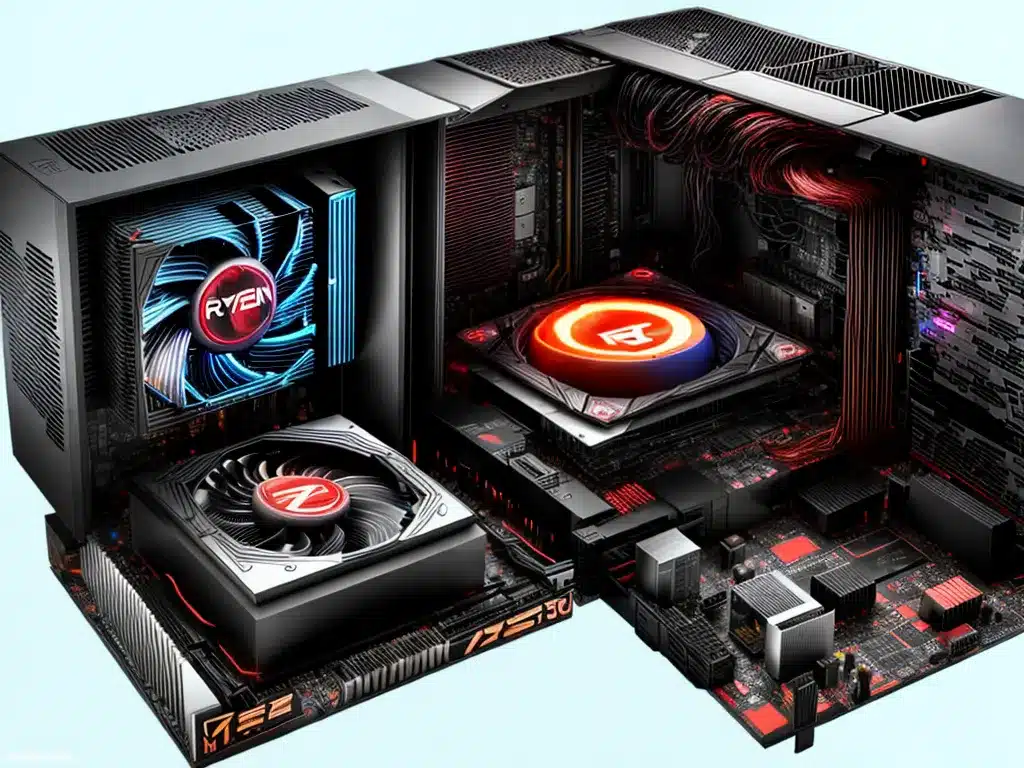

AMD’s newest Ryzen 7000 desktop processors based on the Zen 4 architecture offer significant performance improvements over the previous generation Ryzen 5000 CPUs. In this article, we’ll take an in-depth look at exactly how much faster the Ryzen 7000 series is versus Ryzen 5000 to help you understand the generational performance gains.
An Overview of AMD’s Ryzen 5000 and Ryzen 7000 CPUs
The Ryzen 5000 desktop CPUs were launched in 2020 and are based on AMD’s Zen 3 architecture. They were a major upgrade over the previous Ryzen 3000 series, delivering up to 19% higher instructions per clock (IPC) performance. The Ryzen 5000 family includes models like the 8-core Ryzen 7 5800X and 12-core Ryzen 9 5950X.
The newer Ryzen 7000 chips launched in 2022 use the next-generation Zen 4 architecture. Zen 4 provides another big IPC boost and also brings the transition to a 5nm manufacturing process. AMD is touting over 15% higher single-thread performance for Zen 4. The Ryzen 7000 lineup includes processors like the Ryzen 5 7600X, Ryzen 7 7700X, and flagship 16-core Ryzen 9 7950X.
CPU Architecture Improvements in Zen 4 vs. Zen 3
The architectural enhancements in Zen 4 over Zen 3 that contribute to the performance improvements include:
- A redesigned compute die with two 5nm Zen 4 cores per complex instead of a single core per complex in Zen 3. This improves core density.
- Increased L2 cache capacity from 512KB per core to 1MB per core.
- An upgraded branch predictor for better instruction prefetching and caching.
- Doubling of the L3 cache on each CCD from 16MB to 32MB.
- Support for faster DDR5 system memory versus DDR4 in the prior generation.
These key changes have resulted in the IPC gains AMD has achieved with Zen 4. The new process node and DDR5 memory also provide room for higher clock speeds.
Clock Speed and Core Count Comparisons
When looking at CPU generational performance, two other key factors are core counts and clock frequencies. Here’s an overview of how the Ryzen 7000 and Ryzen 5000 processors compare:
- The Ryzen 9 7950X flagship has 16 cores and a max boost clock of 5.7GHz. This is similar to the Ryzen 9 5950X with 16 cores and 4.9GHz boost.
- For 8-core models, the Ryzen 7 7700X hits 5.4GHz while the Ryzen 7 5800X topped out at 4.7GHz.
- Hexa-core options like the Ryzen 5 7600X run at 5.3GHz, compared to 4.6GHz on the Ryzen 5 5600X.
So Zen 4 is delivering ~500-600MHz higher boost clocks on equivalent core count models versus Zen 3, for additional performance gains.
Real-World Performance Improvements
Now that we’ve covered the architectural and clock speed changes, how do these actually translate to real-world performance? Here are some examples:
- AMD claims the Ryzen 9 7950X is up to 29% faster in single-thread workloads than the Ryzen 9 5950X.
- In their benchmarks of the 8-core models, they found the Ryzen 7 7700X is up to 24% faster than the Ryzen 7 5800X for gaming.
- PassMark single thread rating for the 7950X is 41% higher than the 5950X (4,062 vs. 2,881).
- The Ryzen 5 7600X scores 17% higher in Cinebench R23 single-thread versus the Ryzen 5 5600X.
So the combination of IPC gains, clock speed bumps, and other changes like doubled L3 cache all contribute to double-digit percentage performance improvements in real applications. This makes the Ryzen 7000 series a very compelling upgrade over Ryzen 5000.
Ryzen 7000 Delivers Even Bigger Gains in Multithreaded Workloads
The performance comparisons outlined above focused on single-threaded workload measurements. But Ryzen 7000 Zen 4 also brings nice improvements to multithreaded performance thanks to the increased core cache and memory bandwidth.
Some examples of multithreaded benchmark gains include:
- Up to 46% higher multi-core Cinebench R23 score for the 7950X versus the 5950X.
- 35% higher Geekbench 5 multi-core score for the 7700X over the 5800X.
- The 7950X delivers over 50% higher performance in heavily threaded Blender and V-Ray rendering workloads.
So content creators, developers, and other multi-threaded application users will see great performance scaling with core count from the doubled L2 + L3 cache per CCD complex.
Performance Efficiency Factors
We’ve focused mainly on the performance comparison so far, but Zen 4 and Ryzen 7000 also improve:
- Performance per watt efficiency through architectural enhancements. AMD claims up to +62% performance per watt gains.
- The switch to a dense 5nm manufacturing process from 7nm for Zen 3 also improves efficiency.
- DDR5 memory consumes less power and can enable better performance scaling versus DDR4.
These changes allow Ryzen 7000 chips to run faster while consuming equal or less power than the prior generation. For example, the Ryzen 9 7950X has a 170W TDP, same as the 5950X, but is much faster.
Summary – Ryzen 7000 Offers a Big Performance Jump Over Ryzen 5000
In summary, AMD’s new Ryzen 7000 Zen 4 processors provide significant performance improvements over the previous Ryzen 5000 series based on Zen 3:
- Thanks to IPC gains, new Zen 4 architecture is up to 29% faster in single-thread workloads.
- Higher clock speeds of 5.3GHz to 5.7GHz vs. max 4.9GHz on Ryzen 5000.
- Doubled L3 cache dramatically improves multithreaded performance.
- Benchmark scores show over 50% gains in some multi-threaded apps like rendering.
- Higher performance per watt and the 5nm process also boost efficiency.
So whether you want the best gaming performance or need CPU power for intensive creative workloads, Ryzen 7000 delivers big generational performance leaps over Ryzen 5000. Overall, it’s a very compelling upgrade option for AM4 users.












